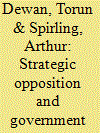| Srl | Item |
| 1 |
ID:
113545


|
|
|
|
|
| Publication |
2012.
|
| Summary/Abstract |
We use a formal theoretical framework to explore the interplay between a government's longevity and its performance. Ministers perform well when their careers are valuable; this is so when the government's duration is expected to be long; the government's survival depends on its popularity; and, finally, that popularity depends on its ministers' performance. The feedback loop between performance and longevity means that multiple rational-expectations equilibria can arise: Ministers work hard for a popular government, but divert efforts elsewhere if they believe the government is doomed; these alternatives are both self-fulfilling prophecies. However, the presence of (perhaps small) random events that buffet the performance and popularity of a government is sufficient to pin down a unique equilibrium. We explore the dynamics that arise: A crisis of confidence involving the rapid collapse of a government's performance is sparked when a sequence of negative shocks push the popularity of the government below a unique critical threshold.
|
|
|
|
|
|
|
|
|
|
|
|
|
|
|
|
| 2 |
ID:
162214


|
|
|
|
|
| Summary/Abstract |
Group members value informed decisions and hold ideological preferences. A leader takes a decision on their behalf. Good leadership depends on characteristics of moderation and judgment. The latter emerges (endogenously) via advice communicated by “trustworthy associates.” Trustworthy advice requires ideological proximity to the leader. A group may choose a relatively extreme leader with a large number of such associates. Paradoxically, this can happen though it is in the group’s collective interest to choose a moderate leader. To assess whether these insights persist when political groups compete, we embed our analysis in a model of elections. Each of two parties chooses a leader who implements her preferred policy if elected. We find that a party may choose an extreme leader who defeats a moderate candidate chosen by the opposing party. Our results highlight the importance of party cohesion and the relations between a leader and her party. These can be more important to electoral success than proximity of a leader’s position to the median voter.
|
|
|
|
|
|
|
|
|
|
|
|
|
|
|
|
| 3 |
ID:
110533


|
|
|
|
|
| Publication |
2011.
|
| Summary/Abstract |
Cohesive government-versus-opposition voting is a robust empirical regularity in Westminster democracies. Using new data from the modern Scottish Parliament, we show that this pattern cannot be explained by similarity of preferences within or between the government and opposition ranks. We look at differences in the way that parties operate in Westminster and Holyrood, and use roll call records to show that the observed behavior is unlikely to be determined by preferences on any underlying issue dimension. Using a simple variant of the agenda-setting model-in which members of parliament can commit to their voting strategies-we show that the procedural rules for reaching collective decisions in Westminster systems can explain this phenomenon: in the equilibrium, on some bills, members of the opposition vote against the government irrespective of the proposal. Such strategic opposition can reinforce government cohesiveness and have a moderating effect on policy outcomes. We introduce new data from the House of Lords, the Welsh Assembly, and the Northern Ireland Assembly to distinguish our claims from competing accounts of the data.
|
|
|
|
|
|
|
|
|
|
|
|
|
|
|
|